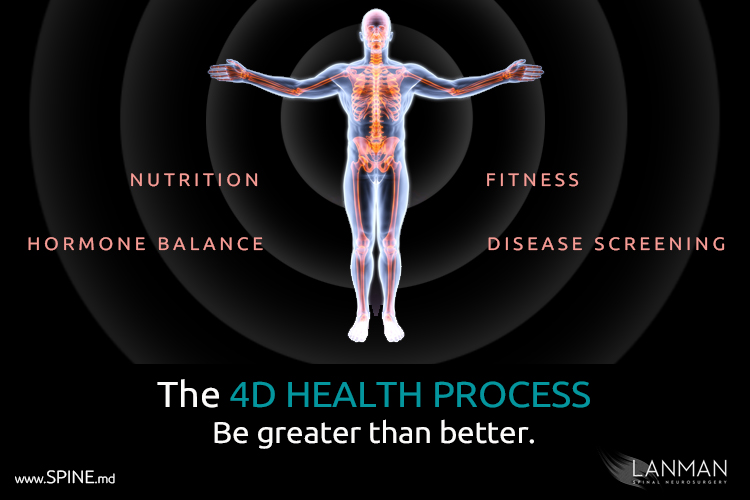A “4D” approach: Be Greater than Better
The good news is that we’re all living longer. The bad news is that most adults don’t know how to live longer.
Advancements in medical technology is largely responsible for longer lifespans – we can cure more, heal faster, and even replace organs and limbs that are broken in the process.
From my work at my practice and as an associate of Cedars-Sinai Medical Center in Los Angeles, I have found that knowledge is often the best medicine. This is especially true when I prepare patients for surgery some of which can call for lengthy periods of post-operative recovery and healing. But what about for the rest of our lives? What about pursuing knowledge that may help us avoid the need for medicine completely?
If we rely on medicine to constantly fix us, then it will be medicine that will constantly keep us alive. What then? Do we really want to live a life carrying around a box of medication? We – and I mean all of us – are coming to the realization that medicine is not always the best answer. The highest quality of life is often achieved when we do better taking care of our bodies. We must at least be aware of limits and open our minds to new possibilities. But we can do better than that. Way better.
A large part of this knowledge is learning more about how our bodies change over time: shrinking muscle mass, faster fat growth, and fatigue. We can learn how bones and joints may not work as well as when we were younger and learn that dysfunction (e.g., back pain, neck pain) is not necessarily the only outcome.
Greater knowledge also gives us a better appreciation of how aging reduces metabolic rates and hormone production and how these important changes affect our bodies and our overall health. We can answer questions like why it’s more difficult to make progress in the gym, why it’s harder to sculpt a desired body shape, and why we react differently to our food intake.
Of course, proactive approach leads to healthier outcomes, but it also can give us more. Imagine what we can do if our focus is shifted toward maintaining energy, movement, excellent bone, and muscle health? What if our goal is to control the process of aging before the body starts to break down?
These questions inspired a concept I call “4D Health”; four dimensions for managing our state of wellness. Not just living for wellness, but reaching for a higher quality of life.
I begin with what physician call asymptomatic disease screening. You may not have any outward signs of disease, but you get screened because experience shows us that the sooner you discover changes in your body that are related to aging, the better the outcomes. What better time to scan for potential problems than when you’re healthy?
The next phase in the “4D” process is a plan for fitness. In this context, the fitness plan is rational: we want to maintain mobility, we need to keep moving. Therefore, we must increase our muscular health by burning fat, keeping our bodies as lean as possible, and ensuring excellent bone health. We are not talking about endless hours on a treadmill. The best approach to fitness is optimizing exercise activity just enough to improve the basal metabolic rate and raise growth hormone levels and testosterone levels naturally.
Another major piece to the 4D process is nutrition. Proper nutrition includes healthy choices of protein and low sugar-added foods – foods that compliment your level of wellness and fitness. For instance, over consumption of sugar is one of the main causes of illness. Too much sugar can lead to weight gain and lipid disorders – even diabetes. An imbalance in sugar intake affects people of all ages. As you are aging, balance in all food areas is vital.
For my patients, I may also incorporate a program of intelligent supplements and possibly hormone replacement, if necessary. Supplements and hormone replacement gives my patients added support to achieve their health goals. Supplements do not replace proper nutrition and hormone replacement is not a permanent solution. They’re only there to help us along the way to wellness; to boost ongoing efforts and give the body additional resources to maintain a healthy, functional, mobile and active life.
Living longer means taking into account that your body is changing. No one wants an inactive lifestyle thrust onto them. We want to be active and able to do things for ourselves. We want to have fun and enjoy life. And for that, we must learn how to look beyond what medicine can do for us. By being proactive, we get after fitness – indeed. But by being smarter about our bodies we can modify activities to avoid injury and disease, and keep moving.
Living longer means taking responsibility for what life you have. This is the 4D Lifestyle Process!
###







